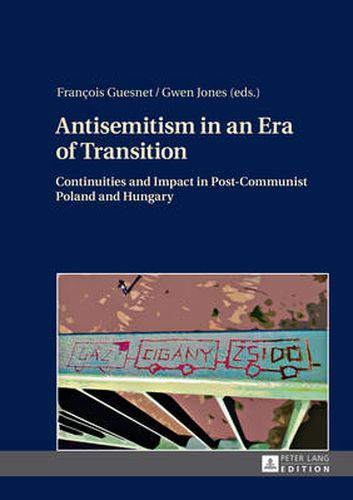Readings Newsletter
Become a Readings Member to make your shopping experience even easier.
Sign in or sign up for free!
You’re not far away from qualifying for FREE standard shipping within Australia
You’ve qualified for FREE standard shipping within Australia
The cart is loading…






This title is printed to order. This book may have been self-published. If so, we cannot guarantee the quality of the content. In the main most books will have gone through the editing process however some may not. We therefore suggest that you be aware of this before ordering this book. If in doubt check either the author or publisher’s details as we are unable to accept any returns unless they are faulty. Please contact us if you have any questions.
The post-Communist transition in Eastern Central Europe has brought about democratic reform, liberalized economies and accession to the European Union, but also the emergence of political movements that revert to antisemitic rhetoric and arguments. This volume compares the genealogies and impact of antisemitism in contemporary Poland and Hungary. Leading and emerging scholars contrast developments in both countries from the last quarter of the nineteenth century to the present, analysing the roles played by organised religion, political leaders, media and press, but also by Communist Parties. They present historical analysis as well as the results of qualitative and quantitative research on contemporary public memory, the image of the Jew, antisemitic media, political constituencies and the interplay of prejudices, specifically anti-Roma racism. A topical bibliography of research on antisemitism in post-Communist Eastern Central Europe offers pathways to further research.
$9.00 standard shipping within Australia
FREE standard shipping within Australia for orders over $100.00
Express & International shipping calculated at checkout
This title is printed to order. This book may have been self-published. If so, we cannot guarantee the quality of the content. In the main most books will have gone through the editing process however some may not. We therefore suggest that you be aware of this before ordering this book. If in doubt check either the author or publisher’s details as we are unable to accept any returns unless they are faulty. Please contact us if you have any questions.
The post-Communist transition in Eastern Central Europe has brought about democratic reform, liberalized economies and accession to the European Union, but also the emergence of political movements that revert to antisemitic rhetoric and arguments. This volume compares the genealogies and impact of antisemitism in contemporary Poland and Hungary. Leading and emerging scholars contrast developments in both countries from the last quarter of the nineteenth century to the present, analysing the roles played by organised religion, political leaders, media and press, but also by Communist Parties. They present historical analysis as well as the results of qualitative and quantitative research on contemporary public memory, the image of the Jew, antisemitic media, political constituencies and the interplay of prejudices, specifically anti-Roma racism. A topical bibliography of research on antisemitism in post-Communist Eastern Central Europe offers pathways to further research.